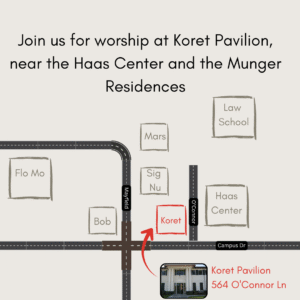Note to guests: these are the notes from a message I shared at one of our Chi Alpha meetings. My goal in this message was not to establish Christianity as true, but rather to demonstrate that God’s existence is a reasonable belief. Most everything I said applies to any theist, whether Christian, Muslim, or Deist.
But Smart People Don�t Believe in God!
There’s a widespread assumption that faith isn’t a viable option for smart and well-educated people: [Carl] Sagan was fascinated by the phenomenon that educated adults, with the wonders of science manifest all around them, could cling to beliefs based on the unverifiable testimony of observers dead for 2000 years. “You’re so smart, why do you believe in God?” he once exclaimed to [cleric Joan Brown] Campbell. Newsweek, 3/31/1997
Likewise, Anne Lamott in her book Traveling Mercies notes that “None of the adults in our circle believed. Believing meant that you were stupid. Ignorant people believed, uncouth people believed, and we were heavily couth.”
Is it true that smart, well-educated people don’t believe in God? Not at all!
We have a list of prominent contemporary scientists who are Christians.
In addition, there are several outstanding philosophers who are Christians:
some who come to mind offhand are Alvin Plantinga (Notre Dame), Dallas Willard (USC), Richard Swinburne (Oxford), and Nicholas Wolterstoff (Yale).
There are smart people at the apex of every discipline who believe.
I would like to point out that this doesn’t prove God exists any more than a list of prominent atheists proves God doesn’t, but it does demonstrate that we shouldn’t be so quick to assume that smart, well-educated people don’t believe.
I’d like to propose the following motto for tonight: “The conflict is thus no longer between faith and reason but between a reasonable faith and a faithless reason.” Robert Morgan
A Few Thoughts On Methodology
Most true things can�t be proven with philosophical rigor, just demonstrated reasonable (that gravity will work tomorrow, that other people really exist, that this isn’t the Matrix, etc).
Our goal, then, is not proof but compelling evidence. In this, God is not unlike other fundamental parts of reality but exactly like them (which is what we should expect).
In the final analysis, we must employ faith. This is true for both atheists and theists�we must trust in a conclusion we cannot prove. That’s not to say that there will be no evidence, but that the evidence will always leave potential for doubt in either direction.
Whence Nature?
By taking a long and thoughtful look at what God has created, people have always been able to see what their eyes as such can’t see: eternal power, for instance, and the mystery of his divine being. So nobody has a good excuse. Romans 1.20, Message
There is a very well-known argument for the existence of God that grounds itself in the fact of existence. It goes like this:
1) The universe and everything in it are finitely old.
2) Everything that is finitely old began to exist.
3) Everything that begins to exist has a cause for its coming into being.
4) Therefore, the universe must have been caused to come into existence.
5) That cause was either infinite or finite. If it was finite, it begs the question.
6) If we push it back, we must ultimately arrive at an uncaused cause.
7) That cause must also exist independently of the universe. It is therefore
supernatural (not natural). It is also staggeringly powerful.
8) Say �Hello, God.�
The sound bite version of this argument is “What went bang?” In other words, assume the Big Bang theory is true and then reflect on the fact that it begs the question of origin.
The argument as I’ve presented it is lean and clean. Arguments about the argument get messy quickly. You can read much more about cosmological arguments for the existence of God here.
Whence Morality?
When outsiders who have never heard of God’s law follow it more or less by instinct, they confirm its truth by their obedience. They show that God’s law is not something alien, imposed on us from without, but woven into the very
fabric of our creation. There is something deep within them that echoes God’s yes and no, right and wrong. Romans 2.14-15, Message
1) Moral obligation is a fact. We must do good and refrain from evil. For example, we have a real obligation to not rape small children regardless of our culture, beliefs, or personal circumstances. This is a fact just as 1+1=2 is a fact.
2) Morality is not an emergent property of matter�it presupposes a nonmaterial reality in which it is embedded.
3) Welcome to a religious worldview.
The sound bite version of this argument is “Can we be good without God?” That may sound offensive at first, and I don�t mean it to. There are many atheists who are moral people. But please notice that I said �Can we be good without God,� not �Can we be good without a belief in God.� You may very well take certain actions apart from your faith or lack thereof, but to label those actions moral or immoral presupposes the existence of morality and that�s what I�m getting at. Where did morality come from? In what are moral laws rooted and on what do they operate?
I contend that the concept of real and binding moral principles is meaningless if matter is all that there is. At most you can get to enlightened self-interest, which doesn’t take you nearly as far as some people pretend.
You can also read an earlier essay I wrote on atheism and amorality.
One last thought: the most common dodge to this argument is to deny that real moral laws exist. Some thoughts can be thought but not lived. In practice the people who make that claim do not truly live as though it were true. If they don’t believe their own objection, why should I?
Whence Religion?
God has done all this, so that we will look for him and reach out and find him. Acts 17.27, CEV
1) People in every society claim to have encountered the supernatural.
2) This is not a handful of people here and there�we�re talking about the overwhelming majority of people who have ever lived (including some of the smartest).
3 )They were (and are) either lying, mistaken, or correct.
4) That they were lying seems incongruous with the morality many of them embodied�we�re talking about some of the greatest moral teachers ever!
5) If they were mistaken, then you must account for their experiences.
6) The best answer seems to be that there are religious people because there are experiences which are best explained religiously.
The sound bite version of this question is, “Do I believe most people are stupid liars?” If not, then you have some data to wrestle with. The problem is that this data isn’t in the public sphere–it’s all testimonial in nature.
Conduct The God Experiment
Therefore, I challenge you to acquire some data of your own. You see, by saying that the God question can’t be settled philosophically I’m implicitly asserting that it has to be settled scientifically: based on experimentaiton and data. One way to acquire data about a hypothesis is to construct an experiment based on the assumption that it is true and see whether the results line up with the hypothesis.
So for the next thirty days, live as though God were real and practice the four G�s.
* Golden Rule: try to treat other people the way you want to be treated.
* Gratitude: try to thank God for every good thing you can, ranging from life and laughter all the way down to food and rest.
* Generosity: try to give to others (time, hospitality, respect, money) liberally
* Going: commit to attending religious services faithfully
In The Final Analysis
I’ve not proven anything tonight. I didn’t set out to. You can quibble with every one of these arguments, but that does not make them any less arguments.
As I told you at the beginning, it’s going to become a matter of faith. You will live your life based in part on a conclusion you can’t rigorously verify.
Frankly, agnosticism isn’t really an option. In practice, you wind up either living as though the claims of the Bible were true or as though they were false. Come Sunday, you will either go to church or you won’t.
You’ll either live as someone who is religious or as someone who is not. I challenge you not to hide behind agnosticism and be honest about where you’re at. This is quite different from saying pretend to know things that you don’t know–there are people who are genuinely puzzled over these issues and I’m not talking to them. I’m saying don’t use agnosticism as a way to say you’re undecided when you have, in fact, decided.
In the final analysis, only you can choose. I hope these lines of evidence help you to think more clearly about the existence of God.
To Learn More
C. S. Lewis Mere Christianity
Os Guinness Long Journey Home: A Guide To Your Search for the Meaning of Life
Brian McLaren Finding Faith: A Self-Discovery Guide For Your Spiritual Quest



